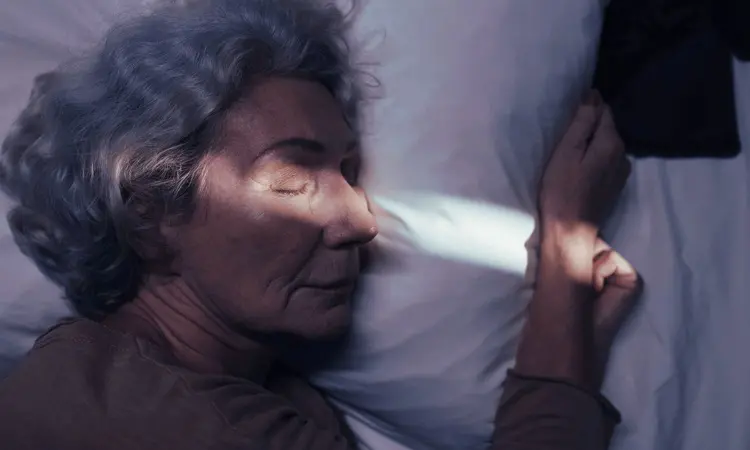- Home
- Medical news & Guidelines
- Anesthesiology
- Cardiology and CTVS
- Critical Care
- Dentistry
- Dermatology
- Diabetes and Endocrinology
- ENT
- Gastroenterology
- Medicine
- Nephrology
- Neurology
- Obstretics-Gynaecology
- Oncology
- Ophthalmology
- Orthopaedics
- Pediatrics-Neonatology
- Psychiatry
- Pulmonology
- Radiology
- Surgery
- Urology
- Laboratory Medicine
- Diet
- Nursing
- Paramedical
- Physiotherapy
- Health news
- Fact Check
- Bone Health Fact Check
- Brain Health Fact Check
- Cancer Related Fact Check
- Child Care Fact Check
- Dental and oral health fact check
- Diabetes and metabolic health fact check
- Diet and Nutrition Fact Check
- Eye and ENT Care Fact Check
- Fitness fact check
- Gut health fact check
- Heart health fact check
- Kidney health fact check
- Medical education fact check
- Men's health fact check
- Respiratory fact check
- Skin and hair care fact check
- Vaccine and Immunization fact check
- Women's health fact check
- AYUSH
- State News
- Andaman and Nicobar Islands
- Andhra Pradesh
- Arunachal Pradesh
- Assam
- Bihar
- Chandigarh
- Chattisgarh
- Dadra and Nagar Haveli
- Daman and Diu
- Delhi
- Goa
- Gujarat
- Haryana
- Himachal Pradesh
- Jammu & Kashmir
- Jharkhand
- Karnataka
- Kerala
- Ladakh
- Lakshadweep
- Madhya Pradesh
- Maharashtra
- Manipur
- Meghalaya
- Mizoram
- Nagaland
- Odisha
- Puducherry
- Punjab
- Rajasthan
- Sikkim
- Tamil Nadu
- Telangana
- Tripura
- Uttar Pradesh
- Uttrakhand
- West Bengal
- Medical Education
- Industry
Direct-to-Patient Interventions may Cut Sedative Use and Enhance Sleep in Older Adults: YAWNS NB Trial

Canada: A recent randomized clinical trial, known as the YAWNS NB study, has revealed that self-guided interventions can significantly reduce the use of benzodiazepine receptor agonists (BZRAs) and improve sleep quality among older adults. The findings, published in JAMA Psychiatry, indicate that this simple and scalable approach has the potential to transform insomnia care on a larger scale.
The findings of the randomized clinical trial demonstrated that it is possible to shift insomnia care for older adults from long-term sedative use to cognitive behavioral therapy for insomnia through a mailed, direct-to-patient approach.
Insomnia is a prevalent issue among older populations, often leading to the overuse of sedative medications, which can come with a range of adverse effects, including dependency and cognitive impairment.
Direct-to-patient interventions that facilitate the transition from long-term benzodiazepine receptor agonist (BZRA) use to cognitive behavioral therapy for insomnia (CBTI) among older adults have the potential to decrease BZRA consumption and associated risks, while also enhancing sleep outcomes, all without necessitating prior clinician involvement. Considering this, David M. Gardner, Department of Psychiatry, Dalhousie University, Halifax, Nova Scotia, Canada, and colleagues aimed to compare two direct-to-patient behavior change interventions with treatment as usual (TAU) in terms of BZRA usage, sleep quality, and other health outcomes, as well as the adoption of CBTI techniques.
For this purpose, the researchers conducted the Your Answers When Needing Sleep in New Brunswick (YAWNS NB) study, a pragmatic, open-label, three-arm randomized clinical trial from November 2020 to June 2022. Participants aged 65 and older were randomly assigned to one of three groups: two different mailed behavior change interventions or a no-intervention control group (treatment as usual, TAU). The study included adults living independently in communities across New Brunswick, Canada, who had a long history of benzodiazepine receptor agonist (BZRA) use and current or past insomnia.
The first intervention, the Sleepwell package (YAWNS-1), consisted of a cover letter and two booklets, “How to Stop Sleeping Pills” and “How to Get Your Sleep Back.” The second intervention, YAWNS-2, featured updated versions of two booklets from the EMPOWER study, titled “You May Be at Risk” and “How to Get a Good Night’s Sleep Without Medication.”
The primary outcome measured was BZRA use at six months, while secondary measures included the use of cognitive behavioral therapy for insomnia (CBTI), sleep quality, insomnia severity, daytime sleepiness, safety, anxiety, frailty, and quality of life.
The study led to the following findings:
- 1295 individuals expressed interest in the study, and 565 completed a baseline assessment. Participants had a mean age of 72.1 years, a mean BZRA use duration of 11.4 years, and 64.1% were female.
- Discontinuations and dose reductions of 25% or greater were highest with YAWNS-1 (26.2%; 20.4%; total, 46.6%) compared with YAWNS-2 (20.3%; 14.4%; total, 34.8%) and TAU (14 of 7.5%; 12.8%; total, 20.3%,).
- YAWNS-1 also demonstrated better uptake of CBTI techniques and sleep outcomes compared with YAWNS-2 (new CBTI techniques: 3.1 versus 2.4; sleep efficiency change: 4.1% versus −1.7%) and reduced insomnia severity and daytime sleepiness compared with TAU (insomnia severity index change: −2.0 versus 0.3; Epworth Sleepiness Scale change: −0.8 versus 0.3).
"The findings revealed that as a simple and scalable direct-to-patient intervention, YAWNS-1 significantly decreased BZRA usage and enhanced sleep quality. This approach has the potential to revolutionize insomnia care for older adults on a broader scale," the researchers concluded.
Reference:
Gardner DM, Turner JP, Magalhaes S, Rajda M, Murphy AL. Patient Self-Guided Interventions to Reduce Sedative Use and Improve Sleep: The YAWNS NB Randomized Clinical Trial. JAMA Psychiatry. Published online September 18, 2024. doi:10.1001/jamapsychiatry.2024.2731
Dr Kamal Kant Kohli-MBBS, DTCD- a chest specialist with more than 30 years of practice and a flair for writing clinical articles, Dr Kamal Kant Kohli joined Medical Dialogues as a Chief Editor of Medical News. Besides writing articles, as an editor, he proofreads and verifies all the medical content published on Medical Dialogues including those coming from journals, studies,medical conferences,guidelines etc. Email: drkohli@medicaldialogues.in. Contact no. 011-43720751


